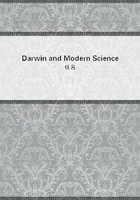
第209章
Darwin undoubtedly realised this when he wrote concerning the "Principles", "the first edition, my old true love, which I never deserted for the later editions." ("M.L." II. page 222.) Huxley once told me that when, in later life, he read the first edition, he was both surprised and delighted, feeling as if it were a new book to him. (I have before me a letter which illustrates this feeling on Huxley's part. He had lamented to me that he did not possess a copy of the first edition of the "Principles", when, shortly afterwards, I picked up a dilapidated copy on a bookstall; this Ihad bound and sent to my old teacher and colleague. His reply is characteristic:
October 8, 1884.
My Dear Judd, You could not have made me a more agreeable present than the copy of the first edition of Lyell, which I find on my table. I have never been able to meet with the book, and your copy is, as the old woman said of her Bible, "the best of books in the best of bindings."Ever yours sincerely, T.H. Huxley.
I cannot refrain from relating an incident which very strikingly exemplifies the affection for one another felt by Lyell and Huxley. In his last illness, when confined to his bed, Lyell heard that Huxley was to lecture at the Royal Institution on the "Results of the 'Challenger' expedition": he begged me to attend the lecture and bring him an account of it. Happening to mention this to Huxley, he at once undertook to go to Lyell in my place, and he did so on the morning following his lecture. Ishall never forget the look of gratitude on the face of the invalid when he told me, shortly afterwards, how Huxley had sat by his bedside and "repeated the whole lecture to him.")Darwin's generous nature seems often to have made him experience a fear lest he should do less than justice to his "dear old master," and to the influence that the "Principles of Geology" had in moulding his mind. In 1845 he wrote to Lyell, "I have long wished, not so much for your sake, as for my own feelings of honesty, to acknowledge more plainly than by mere reference, how much I geologically owe you. Those authors, however, who like you, educate people's minds as well as teach them special facts, can never, I should think, have full justice done them except by posterity, for the mind thus insensibly improved can hardly perceive its own upward ascent." ("L.L." I. pages 337-8.) In another letter, to Leonard Horner, he says: "I always feel as if my books came half out of Lyell's brain, and that I never acknowledge this sufficiently." ("M.L." II. page 117.)Darwin's own most favourite book, the "Narrative of the Voyage", was dedicated to Lyell in glowing terms; and in the "Origin of Species" he wrote of "Lyell's grand work on the "Principles of Geology", which the future historian will recognise as having produced a revolution in Natural Science." "What glorious good that work has done" he fervently exclaims on another occasion. ("L.L." I. page 342.)To the very end of his life, as all who were in the habit of talking with Darwin can testify, this sense of his indebtedness to Lyell remained with him. In his "Autobiography", written in 1876, the year after Lyell's death, he spoke in the warmest terms of the value to him of the "Principles" while on the voyage and of the aid afforded to him by Lyell on his return to England. ("L.L." I. page 62.) But the year before his own death, Darwin felt constrained to return to the subject and to place on record a final appreciation--one as honourable to the writer as it is to his lost friend:
"I saw more of Lyell than of any other man, both before and after my marriage. His mind was characterised, as it appeared to me, by clearness, caution, sound judgment, and a good deal of originality. When I made any remark to him on Geology, he never rested until he saw the whole case clearly, and often made me see it more clearly than I had done before. He would advance all possible objections to my suggestion, and even after these were exhausted would remain long dubious. A second characteristic was his hearty sympathy with the work of other scientific men...His delight in science was ardent, and he felt the keenest interest in the future progress of mankind. He was very kind-hearted...His candour was highly remarkable. He exhibited this by becoming a convert to the Descent theory, though he had gained much fame by opposing Lamarck's views, and this after he had grown old.""THE SCIENCE OF GEOLOGY IS ENORMOUSLY INDEBTED TO LYELL--MORE SO, AS IBELIEVE, THAN TO ANY OTHER MAN WHO EVER LIVED." ("L.L." I. pages 71-2 (the italics are mine.)Those who knew Lyell intimately will recognise the truth of the portrait drawn by his dearest friend, and I believe that posterity will endorse Darwin's deliberate verdict concerning the value of his labours.
It was my own good fortune, to be brought into close contact with these two great men during the later years of their life, and I may perhaps be permitted to put on record the impressions made upon me during friendly intercourse with both.